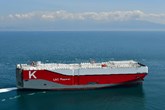Plaquemines Port announces LOI for development of LNG/electric container terminal
Published by Will Owen,
Editor
LNG Industry,
An exclusive Letter of Intent (LOI) leading to development of a multi-modal, state-of-the-art container terminal in Plaquemines Parish, Louisiana, was recently signed by Plaquemines Port Harbor and Terminal District (PPHTD) and several potential partners.
The signing of the LOI kicks off a 6-month ‘due diligence’ period, during which the parties will conduct multiple studies prior to making a final investment decision (FID). The proposed, environmentally friendly container terminal will be powered by a combination of LNG and electricity. It will encompass up to 1000 acres and 8200 ft of Mississippi River frontage just 50 miles from the Gulf of Mexico. Phase one of construction is expected to take as little as two years and will deliver the capability to handle 22 000 TEU class vessels with the ability to expand capacity if needed.
Once the terminal is operational, US Midwest shippers will be able to containerise and export many agricultural products, refrigerated cargo, and chemical resins thanks to American Patriot Holdings (APH), one of the companies who signed the LOI.
APH’s 2375 TEU liner vessel will provide Mississippi River transport as far north as Saint Louis, reaching upriver speeds of 13 mph. APH’s hybrid vessels, with a 1700 TEU capacity, will provide transport service in tributary rivers. The patented no-wake bow and exoskeleton structure, along with LNG propulsion, will reduce shipper transportation costs and improve reliability as they could potentially service inland container centres in and around St. Louis, Jefferson City, Little Rock, Memphis, Joliet, Kansas City, Cairo, and Western Arkansas.
Plaquemines Port Executive Director Sandy Sanders said, “This will be the Gateway Port on the Gulf Coast capable of taking full advantage of the distribution network on the Mississippi and tributary rivers while reducing road congestion in the region and accommodating LNG-powered vessels to enhance environmental sustainability.”
Trudy Newberry, Vice-Chairman of the Plaquemines Port, said, “We are extremely pleased and supportive that the port has attracted several world-class partners to fully explore the development of a modern and efficient terminal in Plaquemines.”
The parties involved believe a strategically located, state-of-the-art facility, designed with the environment in mind, fits perfectly with global shippers’ demands for the future. Developing and operating a modern gateway container terminal on the Gulf Coast will reduce exposure to congestion and improve reliability, and a new LNG terminal proposed adjacent to the facility opens the door for large LNG-powered containerships in the US.
APH’s Principals, Joe Gehegan and Bob McCormack, have recognised that their LNG vessels will provide a vertically integrated transportation system resulting in significant shipper transportation savings and reliability to the Midwest. American Patriot Container Transport CEO Sal Litrico further commented, “We are ready to get this project underway to bring improved global competitiveness to our customers.”
Another key player, Louisiana 23 Development Company, LLC (Devco), led by Chris Fetters, was selected as the exclusive private development partner for Plaquemines Port in December 2019. Devco will provide financial solutions and funding alternatives to support the container terminal development. The company will be responsible for funding and constructing critical infrastructure including rail, warehousing, and utility services. Plaquemines Port and Devco cultivated a strategic alliance with Dallas County Inland Port supplementing the Midwest trade network.
Read the article online at: https://www.lngindustry.com/liquid-natural-gas/17082020/plaquemines-port-announces-loi-for-development-of-lngelectric-container-terminal/
You might also like
‘K’ Line receives LNG-fuelled car carrier
An LNG-fuelled car carrier with a capacity of 6900 vehicles has been delivered to Kawasaki Kisen Kaisha, Ltd.

